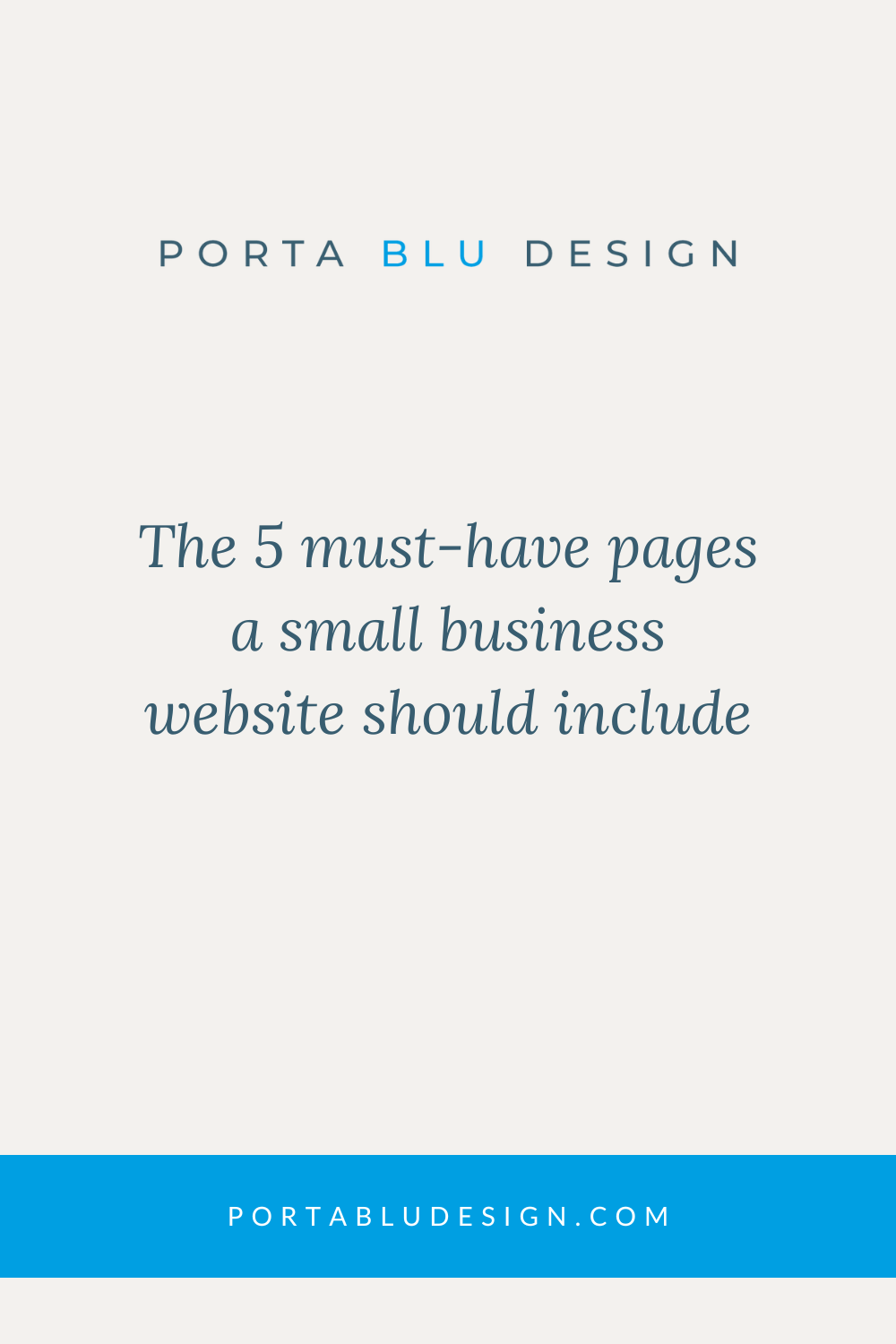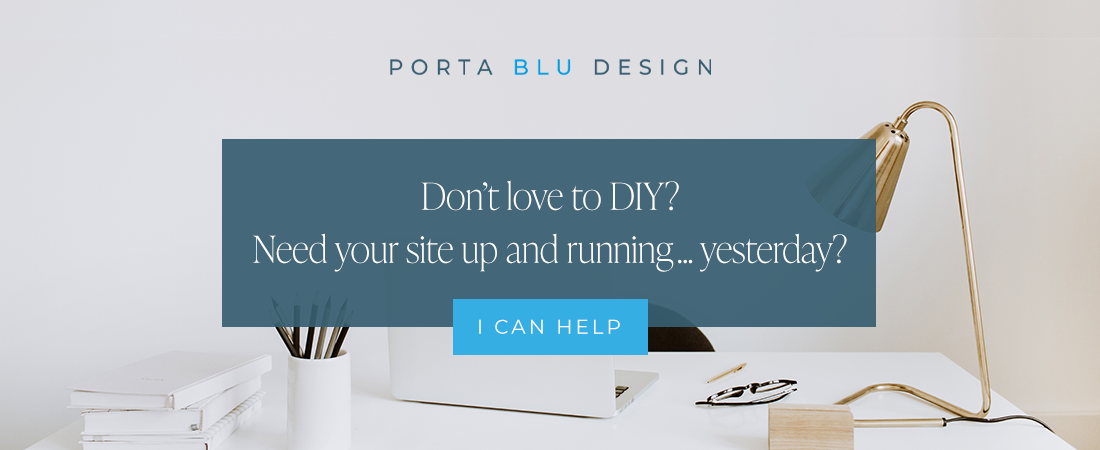5 Must-have pages a small business website needs
Whether you hire a professional website designer or DIY your website with a template, when it comes time to create your page content, you want to have a clear structure in mind.
Think about your audience and how best to help them get the information they need from your website. What content will most benefit them and what kind of a “map” do they need to get to that content?
Why organize your website pages?
✔︎ For a better user experience
Organizing your website content into pages is crucial to ensure a smooth, intuitive user experience. So well-structured website pages will certainly help visitors navigate your site and find what they're looking for quickly and easily.
✔︎ To improve SEO
Clear page navigation can also improve your site's search engine optimization (SEO) by making it easier for search engines to index and understand the content of your website.
✔︎ To project a polished brand
By focusing on the organization of your pages, you can enhance the visual appeal of your website, creating a polished and professional look that reflects positively on your brand.
What makes a website feel welcoming?
Think of your website as your business’s online home. And so to welcome visitors in, you should organize the heck out of it… like Marie Kondo, but for websites.
It’s not all about pretty pictures or fancy functionality. Your website should feel welcoming and organized, while maintaining all the essential elements. Just like your home or office space, an uncluttered website makes it easier for visitors to think clearly, and helps them focus on your content.
Bottom line - when you have a well-structured website whose pages have been thoughtfully presented, you’re providing the prospective customer with a roadmap that helps lead them to the valuable information they’re looking for.
5 Essential pages for a successful website
Home page
Think of your Home page as the digital “front door” to your business or brand. It’s the first impression visitors have, and plays a crucial role in capturing their attention and guiding them further into your website. Just as if you were inviting someone through the front door of your house, you want to things to be tidy, organized, and welcoming.
Considering the limited time you have to engage users, your Home page should immediately establish credibility by effectively communicating your brand’s identity and values, providing essential information (including calls-to-action), and presenting clear page navigation that encourages exploration.
✨ READ MORE 10 Key elements for a successful website homepage
About page
An About page serves as a vital tool for establishing credibility, building trust, and connecting with visitors on a personal level. This page offers an opportunity to showcase the brand's story, mission, and values, allowing users to gain insight into the people behind the business, as well as their valuable experience.
A well-crafted About page can humanize the brand, making it more relatable and engaging for potential customers. By providing background information and highlighting key achievements, businesses can establish a strong foundation for long-term relationships with their audience.
Ultimately, investing time and effort in creating a compelling About page can significantly impact a website's overall success.
Services or Products page
A well-designed Services or Products page is essential for effectively communicating what your business offers. And this page may be the big seller of your website. Key features should include clear and concise descriptions of each service or product, pricing (if applicable), the benefits, and unique features or selling points. This information is going to really help the visitor along in his or her decision-making process.
Invest in some high-quality images or videos that showcase your services or products and engage visitors visually. If you have multiple offerings think about including easy-to-navigate categories or sections, ensuring users can quickly find what they need. Integrate a few customer testimonials or reviews to build trust and credibility, and don’t forget to include strategic calls to action (CTAs) to encourage conversion.
Blog page
A Blog is an essential component of any website, serving as a dynamic platform for sharing valuable insights, updates, and stories that resonate with your audience. It’s one of the best things you can do for your website! It enhances your brand's visibility by improving search engine optimization (SEO), driving organic traffic and attracting potential customers.
The “blog” can be called anything such as “Journal” or “News,” but it’s important to regularly update the content in order to showcase your expertise. A blog also builds credibility, fostering a deeper connection with your target audience, encouraging engagement through comments and shares, and creating a community around your brand.
By integrating a blog into your website, you’ll not only enhance the user experience but also position your brand as a thought leader in your industry, ultimately contributing to sustained growth and success.
Contact page
This page may seem like a no-brainer, but sometimes gets neglected. A Contact page is essential for any small business website, serving as a crucial touchpoint between your business and your customers. It provides a straightforward way for potential clients to reach out with inquiries, feedback, or requests for services, fostering communication and building trust.
Your website’s Contact page should include multiple contact methods—such as a contact form, phone numbers, email addresses, and social media links—making it easy for visitors to connect in their preferred way. You may want to also think about including a short list of FAQs.
This simple yet effective page is vital for cultivating relationships and driving business growth, so be sure it’s a prominent link within your main navigation.
This list of must-have website pages by no means signals that you have to restrict your website to these five pages. In fact, you’ll likely have more website pages, but on a secondary navigation level.
For example, your Services page may be an introduction to your three main services. Each service item may lead to an individual page with content outlining the service in more detail.
However, it’s important that the five top-level pages from the list above live within the main navigation of your website.
A sixth page you should always include on your website
I didn’t include this page in the list above, because it’s not a page that will link directly from your main navigation. But it’s a super IMPORTANT page(s) that your website should have… The Privacy Policy / Terms of Service Page.
You’ll definitely need these legal pages on your website if you:
Have a contact form and collect customer data (email, phone number, etc.)
Have a subscribe feature to collect names and email addresses
Link to any third-party apps (scheduler, etc.)
Use Facebook Ads
Use Google Analytics or other analytics tool
While this page is not an SEO booster for your website, it’s important to include for legal reasons. You can easily link to the page(s) within your website footer, so that it’s not crowding your main website navigation.
✨ READ MORE Why you need a website privacy policy now (and how to get one)
I hope this post has been useful. As always, reach out with questions. Happy designing!
I use Termageddon* for my business’s website to take the guesswork out of maintaining updated legal pages. Protect your business from fines and lawsuits in less than 30 minutes by creating your Privacy Policy, Terms of Service and more. Policies will update automatically as the laws change.
*This is an affiliate link. Full disclaimer.
If you enjoyed this post, you’ll also like:
⚡️ Tips for working with page sections in Squarespace Fluid Engine
⚡️ 7 Useful Squarespace website plugins to check out
⚡️ How to remove the header and footer on a single Squarespace page



